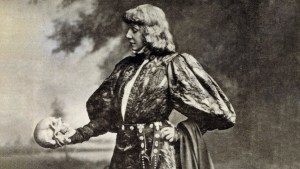Help Aleteia continue its mission by making a tax-deductible donation. In this way, Aleteia's future will be yours as well.
*Your donation is tax deductible!
Not everyone knows this, but William Shakespeare had a distant cousin who was also a poet — the now-sainted Robert Southwell.
Robert was a priest in the 17th century, when it was illegal to be a priest in England. At that time, priests offered secret Masses at night and spent their days hiding in secret holes hollowed out of the walls of houses. After about six years of priesthood, Robert was caught by the Queen’s spies, sent to the Tower of London where he was tortured for three years, and eventually executed.
Robert’s poems were so good that Shakespeare considered his cousin to be the more talented of the two. One of the last poems he wrote during his time in the Tower was a Christmas poem called, “The Burning Babe.” In it, he describes standing in winter snow and having a vision of an infant covered in fire but remaining unharmed, much like the burning bush that Moses saw. The child speaks, saying, “My faultless breast the furnace is, the fuel wounding thorns,/ Love is the first, and sighs the smoke, the ashes shame and scorns.”
A blessed holiday in prison
Robert wakes from his vision, writing, “With this he vanished out of sight and swiftly shrunk away,/ And straight I called unto mind that it was Christmas day.” He is spending the holiday in prison, but is truly blessed because he has caught a glimpse of the Christ child and into the very heart of Christmas.
Shakespeare loved this poem and quoted it in one of his own called, “New heaven, new warre.”
Like his cousin, Shakespeare describes how powerful sacrificial love is, how Christmas reveals the startling truth that an innocent child can conquer the world. It isn’t through strength and power that we triumph, but through the weakness of love. In this, a small child shall lead us.
A very serious celebration
This is so important for us to realize. The joy of Christmas, the atmosphere of goodwill, the angels shouting the good news, the children dressed up as sheep in the play at church, the gifts and the generosity, all of this hits so close to our hearts because not because Christmas is kitschy and frivolous, but because it is so very, very serious. The nativity of Christ is the revelation that love is a fire that burns away our imperfections and saves us.
When I was a child, Christmas was all about the gifts I was about to get, but as my family has grown and I’ve been blessed with children of my own, I look forward to Christmas as an incarnation of the love I see all around me — the kids making an endless supply of gifts crafted out of construction paper and glue, watching them gather in the kitchen with their mom kneading dough and dropping sprinkles everywhere as they make cookies. This is Christmas, and love is the fire that makes it bright.
As your family gathers over Christmas, a recitation of Robert Southwell’s poem would be fitting:
The Burning Babe
As I in hoary winter’s night stood shivering in the snow,
Surpris’d I was with sudden heat which made my heart to glow;
And lifting up a fearful eye to view what fire was near,
A pretty Babe all burning bright did in the air appear;
Who, scorched with excessive heat, such floods of tears did shed
As though his floods should quench his flames which with his tears were fed.
“Alas!” quoth he, “but newly born, in fiery heats I fry,
Yet none approach to warm their hearts or feel my fire but I!
My faultless breast the furnace is, the fuel wounding thorns,
Love is the fire, and sighs the smoke, the ashes shame and scorns;
The fuel Justice layeth on, and Mercy blows the coals,
The metal in this furnace wrought are men’s defiled souls,
For which, as now on fire I am to work them to their good,
So will I melt into a bath to wash them in my blood.”
With this he vanish’d out of sight and swiftly shrunk away,
And straight I called unto mind that it was Christmas day.



